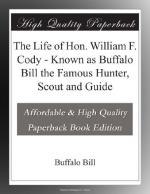This proved to be a lucky march for us as far as gaining on Penrose was concerned, for the route he had taken on the west side of the stream turned out to be a bad one, and we went with our immense wagon train as far in one day as Penrose had in seven. His command had marched on to a plateau or high table-land so steep, that not even a pack mule could descend it, and he was obliged to retrace his steps a long ways, thus losing three days time as we afterwards learned.
While in this camp we had a lively turkey hunt. The. trees along the banks of the stream were literally alive with wild turkeys, and after unsaddling the horses between two and three hundred soldiers surrounded a grove of timber and had a grand turkey round-up, killing four or five hundred of the birds, with guns, clubs and stones. Of course, we had turkey in every style after this hunt—roast turkey, boiled turkey, fried turkey, “turkey on toast,” and so on; and we appropriately called this place Camp Turkey.
From this point on, for several days, we had no trouble in following Penrose’s trail, which led us in a southeasterly direction towards the Canadian River. No Indians were seen, nor any signs of them found. One day, while riding in advance of the command, down San Francisco Creek, I heard some one calling my name from a little bunch of willow brush on the opposite bank, and, upon looking closely at the spot, I saw a negro.
“Sakes alive! Massa Bill, am dat you?” asked the man, whom I recognized as one of the colored soldiers of the Tenth Cavalry. I next heard him say to some one in the brush: “Come out o’ heah. Dar’s Massa Buffalo Bill.” Then he sang out, “Massa Bill, is you got any hawd tack?”
“Nary a hard tack; but the wagons will be along presently, and then you can get all you want,” said I.
“Dat’s de best news I’se heerd foah sixteen long days, Massa Bill,” said he. “Where’s your command? Where’s General Penrose?” I asked.
“I dunno,” said the darkey; “we got lost, and we’s been a starvin’ eber since.”
By this time two other negroes had emerged from their place of concealment. They had deserted Penrose’s command—which was out of rations and nearly in a starving condition—and were trying to make their way back to Fort Lyon. General Carr concluded, from what they could tell him, that General Penrose was somewhere on Polladora Creek; but we could not learn anything definite from the starved “mokes,” for they knew not where they were themselves.
Having learned that General Penrose’s troops were in such bad shape, General Carr ordered Major Brown to start out the next morning with two companies of cavalry and fifty pack-mules loaded with provisions, and to make all possible speed to reach and relieve the suffering soldiers. I accompanied this detachment, and on the third day out we found the half-famished soldiers camped on the Polladora. The camp presented a pitiful sight, indeed. For over two weeks the




